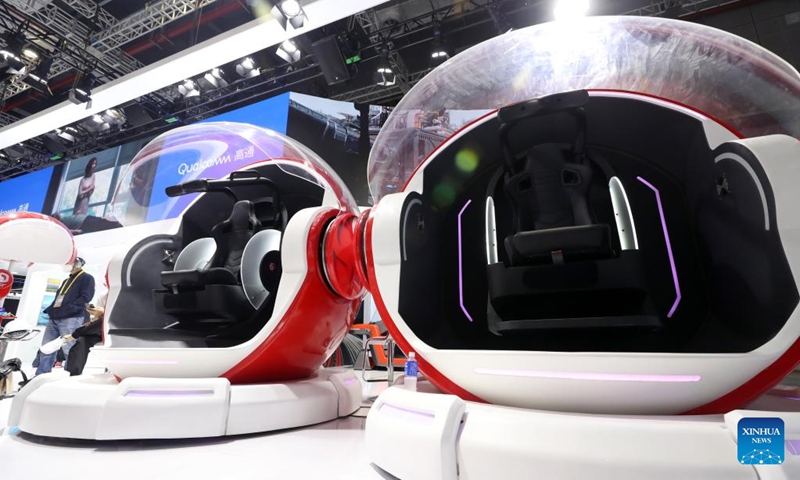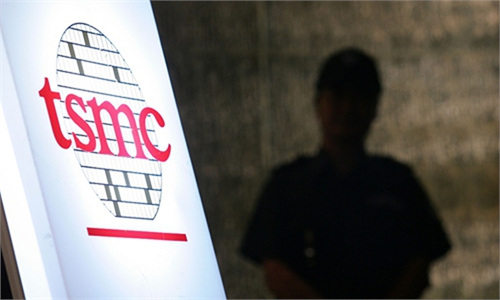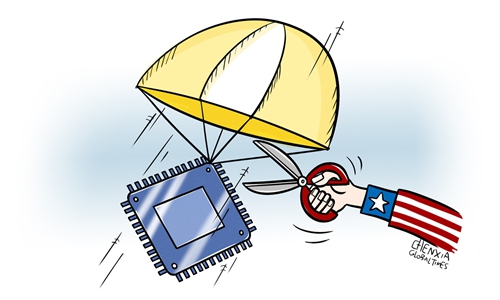
This photo taken on Nov. 2, 2022 shows gaming capsules of U.S. company Qualcomm to be displayed in the upcoming fifth China International Import Expo (CIIE) in east China's Shanghai. The fifth CIIE will be held in Shanghai from Nov. 5 to 10. Representatives from a total of 145 countries, regions and international organizations will participate in the upcoming fifth China International Import Expo (CIIE) in Shanghai, the organizer said on Tuesday.(Photo: Xinhua)
Global companies in the integrated circuit (IC) sector continued to rush to display their latest technologies at the 5th China International Import Expo (CIIE) in Shanghai, where a designated display zone was set up for ICs for the second consecutive year, underscoring growing foreign firms' confidence in China's IC market despite the US' strengthened blockade and calls for decoupling.
Top chip giants, including Qualcomm, AMD and ASML, all had a presence at the CIIE this year. Newcomers like Japanese Renesas Electronics, one of the world's top 10 chip suppliers, also joined in, vowing to step up investment and stick to long-term development in the world's second-largest economy.
The Chinese market is becoming more and more important to Renesas Electronics, and it will always be important. No matter how the external environment changes, China is one of the fastest-growing markets, Lai Changqing, president of Renesas Electronics China, told domestic news site yicai.com, noting that it will continue to put down roots in China and increase investment in the country.
Apart from multinational companies, participants covering multiple links along the entire industrial chain - from equipment manufacturing and chip design to semiconductor materials - also showcased their latest products and equipment around cutting-edge technologies such as the Metaverse, artificial intelligence and robotics.
Global chip giants' participation showed their optimism about China's development potential and determination to embrace the Chinese market amid the current global economic downturn and rising protectionism, Zhao Lijian, a spokesperson for the Chinese Foreign Ministry, told a regular press conference in Beijing on Thursday.
It proves that China's promotion of high-quality development and the expansion of high-level opening-up are in line with the trend of development and the progress of the times, Zhao said.
Zhao stressed that the formation and development of the global chip industry chain is the result of the combined effect of market laws and corporate choices.
"A certain country has repeatedly abused its national power, politicized, instrumentalized and weaponized sci-tech and trade issues, maliciously suppressed China, which will not only seriously undermine global trade rules, but also damage the stability of the global industrial chain," Zhao said.
Global chipmakers are increasingly frustrated over the US' chip ban on China, which could lead to plunging sales, shrinking investment plans and growing concerns for operations, which are already under pressure from sluggish demand.
In early October, the US government announced a broad set of technology export controls, including a ban on shipments to China of certain semiconductor chips made anywhere in the world with US equipment. But the US has so far been unable to persuade its so-called allies to get on board and join in the curbs.
A Chinese industry official who is a five-year CIIE veteran told the Global Times on condition of anonymity that from his own experience and exchanges with industry insiders at the fair, he felt that it was very difficult for foreign technology companies to give up and exit the Chinese market, despite US efforts to coerce them with export controls and long-arm jurisdiction.
This is the market where significant capital expenditure is happening and where these companies have unmatchable products and services.
"From a pure business perspective, the US curbs make no sense to them and greatly impede their business and progress. I think, for these companies, to continue to dedicate themselves to the Chinese market would be the posture, while working on ways to circumvent US curbs to be 'compliant,'" said the official.
Industry players have warned that if the new measures are strictly implemented, it could put as much as 30 percent of some US and global chip industry giants' total revenue at risk, as China accounts for one-third of their total revenue.
The anonymous official revealed that, in one instance at the CIIE, a large foreign semiconductor industry player "timely" demonstrated its lithography machines as Netherlands-based ASML came into the spotlight amid escalating US tech restrictions on China. "It probably envies ASML, which has had all the fame, and perhaps believes it can have some of the market share, should ASML choose to cede."
Amid global economic recession and weaker demand in the chip market, companies need to actively expand into emerging markets, and the Chinese chip market is the one with the most growth potential, Guo Tao, a veteran industry analyst, told the Global Times on Thursday.
In order to avert the US controls on exporting chips to China, chip giants have actively developed new products that are really suitable for the Chinese market. Participating in the CIIE is expected to help them to further open up the Chinese market, Guo said.
"We will continue to work with the international community to jointly oppose economic coercion and technological bullying, and jointly maintain the stability of the rules and foundations of the world economic system and the security of global industrial and supply chains," said Zhao, the spokesperson.
"At the same time, we will also take this CIIE as an opportunity to continue to open our doors, provide convenience for companies from all over the world to invest in China, and work together to create a more united and prosperous future," Zhao said.



